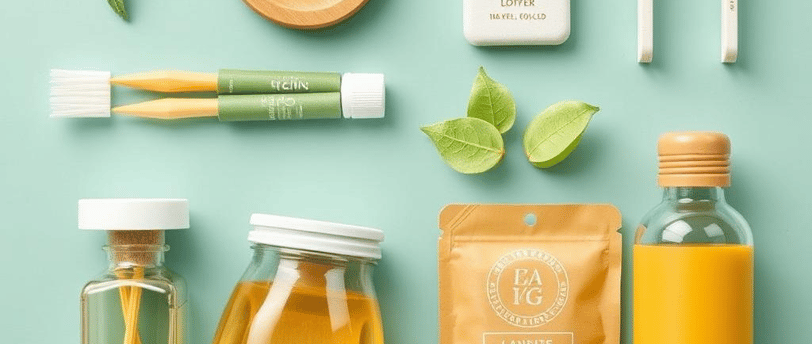Simple Swaps: Eco-Friendly Alternatives for Everyday Items
♻️LIFESTYLE & SUSTAINABILITY


As global awareness of environmental issues continues to grow, many individuals are seeking ways to reduce their ecological footprint. One of the simplest and most effective methods to do so is by making eco-friendly swaps in our daily lives. From household products to personal care items, there are a plethora of sustainable alternatives available that can contribute to environmental conservation without compromising our everyday conveniences. In this article, we will explore practical and achievable swaps that anyone can implement to lead a more eco-conscious lifestyle.
1. Plastic Bags to Reusable Bags
One of the most visible signs of our plastic consumption is the ubiquitous plastic grocery bag. These bags are often used just once before being discarded, contributing to the global plastic waste crisis. Instead of opting for single-use plastic bags, consider investing in reusable shopping bags made from fabric or other sustainable materials. Not only are these bags sturdier and capable of holding more weight, but they also add a touch of style to your grocery trips. Many stores now offer incentives for using reusable bags, translating into both environmental benefits and savings in your pocket.
2. Bottled Water to Reusable Water Bottles
The convenience of bottled water comes at a significant environmental cost. The production and disposal of plastic water bottles result in massive amounts of waste and energy consumption. Transitioning to a reusable water bottle, preferably made from stainless steel or glass, can dramatically reduce your plastic use. Infuse your reusable bottle with fresh fruits, herbs, or simply water from a home filtration system to enjoy refreshing beverages without the environmental harm. Many reusable bottles now feature built-in filters, ensuring you're drinking clean water without relying on single-use plastic.
3. Disposable Razors to Safety Razors
Disposable razors are a common yet environmentally damaging item. They are typically made of plastic and cannot be recycled easily. Instead, switch to safety razors, which are made of metal and can last for years with proper care. Safety razors use replaceable blades, which significantly reduces waste compared to disposable razors. Not only will you make an eco-friendly choice, but you may also find that safety razors provide a closer and more comfortable shave.
4. Chemical Cleaners to Natural Cleaners
Household cleaning products can contain harsh chemicals that are harmful to both health and the environment. Many traditional cleaning products contribute to indoor air pollution and can contaminate water systems. Consider creating your own natural cleaners at home using ingredients like vinegar, baking soda, and essential oils. These alternatives are effective, safe, and often cheaper than their chemical-laden counterparts. For instance, a mixture of vinegar and water can be a great all-purpose cleaner, while baking soda can tackle tougher stains.
5. Fast Fashion to Sustainable Fashion
The fashion industry's environmental impact is staggering, characterized by unsustainable production methods and textile waste. The rise of fast fashion has perpetuated a cycle of buying and discarding clothes at an alarming rate. Instead of participating in this cycle, consider investing in sustainable fashion brands that prioritize ethical sourcing and production processes. Thrift shopping and swapping clothes with friends are excellent alternatives that promote circular fashion while allowing your wardrobe to flourish with unique finds. Additionally, learning basic sewing skills can help you repair and upcycle your existing clothing, extending its life cycle.
6. Single-Use Coffee Cups to Reusable Coffee Cups
For coffee lovers, the convenience of grabbing a cup while on the go often means relying on single-use coffee cups. These cups, made from paper and lined with plastic, are not recyclable in most regions. Instead, swap your disposable coffee cup for a reusable one, which can be made from materials like stainless steel, silicone, or ceramic. Many coffee shops now offer discounts for bringing your reusable cup, making this eco-friendly swap not only beneficial for the planet but also more economical for you.
7. Plastic Wrap to Beeswax Wraps
Plastic wrap is often used for food storage but contributes to extensive plastic pollution after a single use. An eco-friendly alternative is beeswax wraps, which are reusable, biodegradable, and can be used to cover food items or wrap veggies and sandwiches. Made from organic cotton infused with beeswax, these wraps provide a breathable and sustainable way to keep food fresh without relying on plastic. They can be easily cleaned with mild soap and cool water, promoting a zero-waste lifestyle.
8. Conventional Toilet Paper to Bamboo Toilet Paper
Standard toilet paper is usually made from trees, contributing to deforestation and the depletion of natural resources. Bamboo toilet paper is an effective and sustainable alternative, as bamboo is a rapidly renewable resource that grows without the need for pesticides or chemical fertilizers. In addition, bamboo toilet paper is often softer and more durable than traditional options. By making this simple switch, you can help preserve forests and promote sustainable forestry practices.
9. Chemical Sunscreens to Reef-Safe Sunscreens
Most mainstream sunscreens contain chemicals that can harm marine life, particularly coral reefs, which exhibit bleaching when exposed to these substances. To protect both your skin and the environment, opt for reef-safe sunscreens made with mineral ingredients like zinc oxide or titanium dioxide. These formulations provide effective sun protection while being safer for aquatic ecosystems. Also, consider wearing protective clothing or seeking shade during peak sun exposure to further reduce your reliance on sunscreen.
Conclusion
In today's world, making eco-friendly choices doesn't have to be overwhelming or costly. The above simple swaps can yield substantial benefits for the environment while seamlessly fitting into your daily routine. Each individual's contribution counts, and by consciously choosing sustainable alternatives, we can create a cumulative positive impact on our planet. Remember, small changes lead to big results—so start making these simple swaps today and inspire others to follow suit! Together, we can contribute to a healthier, more sustainable future for generations to come.
